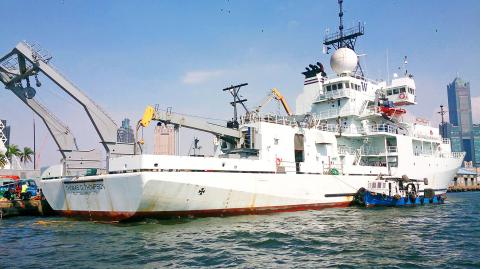The Ministry of National Defense yesterday downplayed the presence of a US Navy ship in Kaohsiung, saying it is a research vessel and urged people to stop speculating about its mission or how it relates to US policy.
The Thomas G. Thompson dropped anchor in the Port of Kaohsiung on Monday morning to replenish supplies and for crew replacement, Taiwan International Ports Corp (TIPC, 台灣港務) said in a statement.
The ship is owned by the Office of Naval Research.

Photo: CNA
It has visited Taiwan four times for resupply since its maiden voyage in April, the company said.
During a question-and-answer session at the Legislative Yuan in Taipei, Chinese Nationalist Party (KMT) legislators Jason Hsu (許毓仁) and Lin Li-chan (林麗蟬) asked Minister of National Defense Yen De-fa (嚴德發) if the boat’s presence is connected to the US’ National Defense Authorization Act for fiscal year 2019 or a US military show of force in the region.
The ministry monitors every vessel that enters the nation’s territorial waters, Yen said, adding that while the Thomas G. Thompson is nominally a US Navy vessel, it is operated by the University of Washington and exclusively for academic research.
The ship has no other known relationship with the US military and there is no reason to interpret its presence in Kaohsiung as related in any way to US legislation or a show of force in the South China Sea or waters near Taiwan, he said.
Earlier in the day, ministry spokesman Major General Chen Chung-chi (陳中吉) said the vessel’s mission is to exchange scientific data with National Taiwan University (NTU) oceanographers and atmospheric researchers.
The ship has been gathering data on regional oceanic currents in connection with an academic program that NTU announced last year on its Web site, he said.
“Public speculation [over the matter] is misplaced. This is a pure and simple scientific research mission,” he said.
However, retired navy captain Lu Li-shih (呂禮詩) said that the timing of the US vessel’s appearance in Taiwanese waters is of interest.
The ship is equipped with remote-operated vessels and autonomous underwater vehicles for conducting oceanographical surveys, which are essential for military navigation through a maritime region, said Lu, who is an instructor at the Republic of China Naval Academy in Kaohsiung.
The ship, which is heading to Fremantle, Australia, could have stopped in the Philippines instead of Kaohsiung for supplies, Lu said, adding that the seas near Kaohsiung are strategically important for submarine and anti-submarine warfare.
The last time the Thomas G. Thompson, which has a gross tonnage of 3,095, anchored off Kaohsiung was from May 3 to May 17, the TIPC said.
The ship is expected to depart for Australia at 6am tomorrow, it said.
Port of Kaohsiung workers said they saw the crew unloading the vessel’s radar for disassembly and storage in a cargo container.
Additional reporting by CNA

SECURITY: As China is ‘reshaping’ Hong Kong’s population, Taiwan must raise the eligibility threshold for applications from Hong Kongers, Chiu Chui-cheng said When Hong Kong and Macau citizens apply for residency in Taiwan, it would be under a new category that includes a “national security observation period,” Mainland Affairs Council (MAC) Minister Chiu Chui-cheng (邱垂正) said yesterday. President William Lai (賴清德) on March 13 announced 17 strategies to counter China’s aggression toward Taiwan, including incorporating national security considerations into the review process for residency applications from Hong Kong and Macau citizens. The situation in Hong Kong is constantly changing, Chiu said to media yesterday on the sidelines of the Taipei Technology Run hosted by the Taipei Neihu Technology Park Development Association. With

CARROT AND STICK: While unrelenting in its military threats, China attracted nearly 40,000 Taiwanese to over 400 business events last year Nearly 40,000 Taiwanese last year joined industry events in China, such as conferences and trade fairs, supported by the Chinese government, a study showed yesterday, as Beijing ramps up a charm offensive toward Taipei alongside military pressure. China has long taken a carrot-and-stick approach to Taiwan, threatening it with the prospect of military action while reaching out to those it believes are amenable to Beijing’s point of view. Taiwanese security officials are wary of what they see as Beijing’s influence campaigns to sway public opinion after Taipei and Beijing gradually resumed travel links halted by the COVID-19 pandemic, but the scale of

A US Marine Corps regiment equipped with Naval Strike Missiles (NSM) is set to participate in the upcoming Balikatan 25 exercise in the Luzon Strait, marking the system’s first-ever deployment in the Philippines. US and Philippine officials have separately confirmed that the Navy Marine Expeditionary Ship Interdiction System (NMESIS) — the mobile launch platform for the Naval Strike Missile — would take part in the joint exercise. The missiles are being deployed to “a strategic first island chain chokepoint” in the waters between Taiwan proper and the Philippines, US-based Naval News reported. “The Luzon Strait and Bashi Channel represent a critical access

Pope Francis is be laid to rest on Saturday after lying in state for three days in St Peter’s Basilica, where the faithful are expected to flock to pay their respects to history’s first Latin American pontiff. The cardinals met yesterday in the Vatican’s synod hall to chart the next steps before a conclave begins to choose Francis’ successor, as condolences poured in from around the world. According to current norms, the conclave must begin between May 5 and 10. The cardinals set the funeral for Saturday at 10am in St Peter’s Square, to be celebrated by the dean of the College